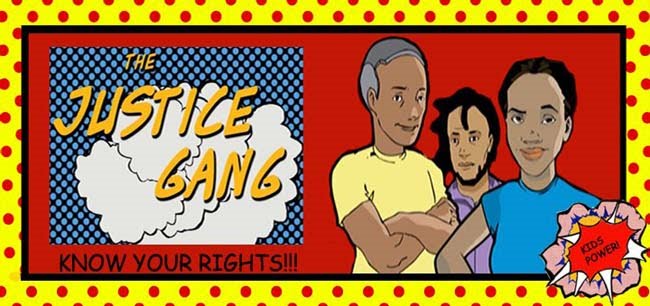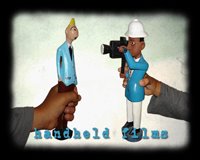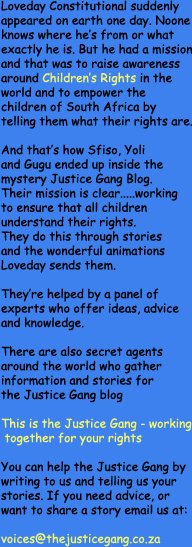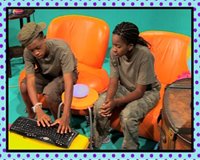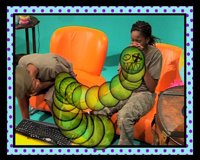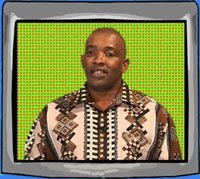I hope you are all well, and managing to keep warm in this Winter weather. All of us tend to use a lot of fuel in Winter to keep warm whether it's gas, wood, coal, paraffin, or using double the amount of electricity. Unfortunately, although keeping warm is important, using all these extra natural resources isn't very good for the planet. Did you know that you have the Right to Walk Lightly on the Earth? Let's take a look at what this means.
 Here's a letter we received from someone who watches our TV programme on the SABC.
Here's a letter we received from someone who watches our TV programme on the SABC.Dear Justice Gang,
These days I can’t seem to stop worrying about all the stuff that gets made in factories every day; all the stuff that’s for sale in the shops. Where are we going to put it all? We’re drowning in stuff!! We seem to be using up more and more of the earth’s resources to produce more and more stuff. Don’t you ever worry that one day the earth is going to be so full of stuff that there’s not going to be any room for all the beautiful things like trees and flowers? Do we really need all the stuff we buy? As I see it, the main problem is that people don’t think twice before buying something. And they don’t recycle!! How on earth are we going to get people to stop and think about the stuff they buy before they buy stuff that’s just going to end up in the landfill in 6 months??!!
Yours Sincerely
Desperately-worried-about-the-planet
Now, here's something interesting we found out, Ecuador, which is a country in South America has become the first nation in the world to grant constitutional rights to the natural environment!! It means that now in Ecuador, rivers, forests, plants and animals have the same rights that humans do. If nature has the same rights as people then any damage to the environment in Ecuador is illegal, whether people are harmed or not! People do not have to prove that environmental hazards have harmed them or their property to make a claim against a polluter. This is groundbreaking!
Let's find out what we can do to help protect the environment:
One of the UN Millennium Development Goals is to ensure environmental sustainability, which means protecting the Environment for Future Generations. Governments can help by making laws to protect the environment, but isn’t it up to all of us to look after the earth, so that we have something to leave those who come after us? Do you ever stop to think about how your own activities affect the earth?
Like many teens around the world, your room is probably full of stuff, right? Okay I know kids in South Africa probably don’t have nearly the same amount of stuff as kids in richer countries, but we’ve probably got more than we really need. Come on be honest with yourself! Now have you ever wondered where all the stuff we buy comes from and where it goes when we throw it out? Do you try to tread lightly on the earth or do you walk heavily, not caring how much of the earths resources you use as long as you have everything you want?
We live on a finite planet, which means there are only so many natural resources available to make all the stuff that we own. And the truth is, we are using too much stuff and the planet is running out of resources. In the past three decades, one-third of the planet’s natural resources base has been used up. Gone!
 Not only are we using up natural resources but over 100,000 synthetic chemicals are being mixed in with the natural resources to make the stuff. Hardly any of these have been tested for effects on human health. But you can be sure that if toxins are going into the stuff, it’s sure to come out and that will be in our homes, workplaces and schools.
Not only are we using up natural resources but over 100,000 synthetic chemicals are being mixed in with the natural resources to make the stuff. Hardly any of these have been tested for effects on human health. But you can be sure that if toxins are going into the stuff, it’s sure to come out and that will be in our homes, workplaces and schools.If you are curious about how your activities affect the planet (and you should be!!), you can take a quiz that will show you what your ecological footprint is.
Definition:
Your ecological footprint is a measure of how much of the earths natural resources are needed to support your lifestyle.
Everyone has an ecological footprint because we all need to use the earth’s resources to survive. But we must make sure we don’t take more resources than the earth can provide. The quiz will show you how many planets would be needed if everyone in the world consumed the same way you do. You might find that it will take between 3 and 7 planets! But of course we don’t have 7 planets, or even 3. We only have 1 and we need to take care of it. Tread lightly on the planet, my friends, tread lightly!
1. To measure your environmental footprint visit http://www.earthday.net and click on Environmental Footprint. Or just click here.
2. If you are worried about Stuff, and want to find out more about the things you buy, where they come from and where they go, Google The Story of Stuff to watch a 20 minute animation by Annie Leonard. Or just click here.
Here's a story about a boy who helped his family to walk lightly on the earth. Maybe you can do the same.
"My name is Temba and I am 13 years old. The other day I measured my ecological footprint and was shocked to see that if everyone used the same amount of energy and resources as me, to live, then we would need 4 planets to support all the people in the world. I wondered how this could be possible? After all, I live in an ordinary family, in an ordinary house. We are comfortable but not super rich. How come it would take so many planets to support us? Then I started to look around my house. The bathroom light was on, even though there was no one in it. The outside porch light was on, even though it was broad daylight. My Dad’s cell phone charger was still plugged into the wall even though his cell phone was fully charged. My Mom drove my sister to her friend’s house, which was three blocks away. Then she came back, and five minutes later she went out in the car again because we needed bread and milk. I began to see how it was possible that 4 planets are needed to support families like ours.
I looked at all the packaging and empty containers, and plastic bags that ended up in our rubbish bin. If everyone has rubbish bins like ours, imagine how much rubbish must end up in the landfills each and every day. I found out that each household in South Africa produces about 1 tonne of waste each year! I also found out that 500 billion plastic bags are used in the world every year and that it takes about 400 years for plastics to break down in a landfill, and when they do break down, they release harmful toxins into the environment. Just look at all the rubbish that ends up in landfills:

 That night I sat my family down and I told them about my ecological footprint and I invited them to sit at the computer and do their own. They were as shocked as I was to find out they were over-users of energy and resources.
That night I sat my family down and I told them about my ecological footprint and I invited them to sit at the computer and do their own. They were as shocked as I was to find out they were over-users of energy and resources.Then I let them know a couple of hard-hitting facts:
About 550 000 tons of waste glass finds its way into landfills in South Africa each year
It takes one million years for a glass bottle to break down in a landfill.
Only 26% of all glass containers produced are taken for recycling
The energy saved from recycling one glass bottle can run a 100-watt light bulb for four hours. It also causes 20% less air pollution and 50% less water pollution than when a new bottle is made from raw materials.
We decided, as a family, to make a greater effort to recycle as much as we could. The first thing we did was to set up a compost bin in the garden for all the vegetable peels and other organic waste. Next we set up a number of bins in the garage so that we could separate out our waste at the source to make it easier to take it for recycling. We also think about ways we can re-use things so that they don’t end up in the trash or in the recycling.
 Recycling and Reusing, help to reduce your ecological footprint because energy is saved and pollution is decreased. Now our new family motto is: Reduce, Reuse and Recycle."
Recycling and Reusing, help to reduce your ecological footprint because energy is saved and pollution is decreased. Now our new family motto is: Reduce, Reuse and Recycle."That's it for this week. Don't forget, we'd love to hear your stories, and if you need any help with questions, we'd be delighted to answer them.
 Bye for now
Bye for nowGugu
